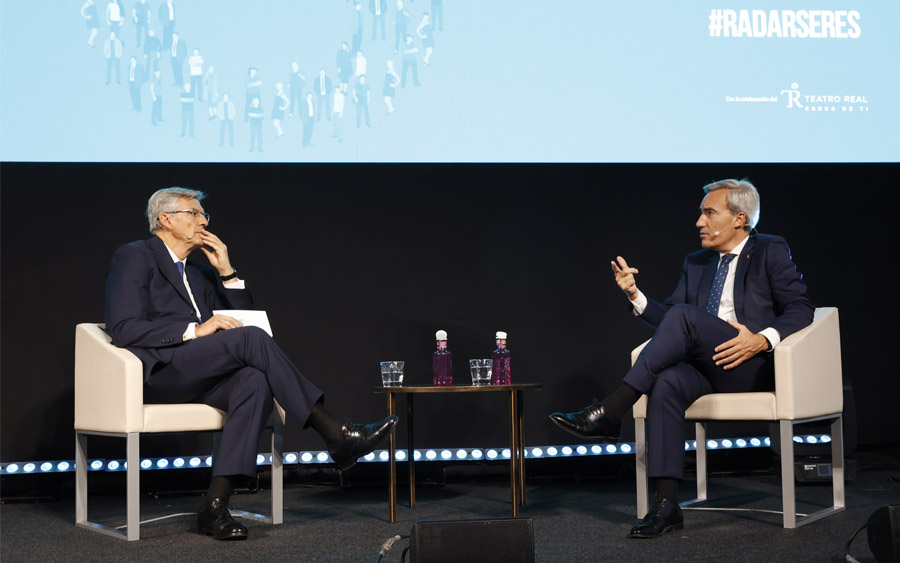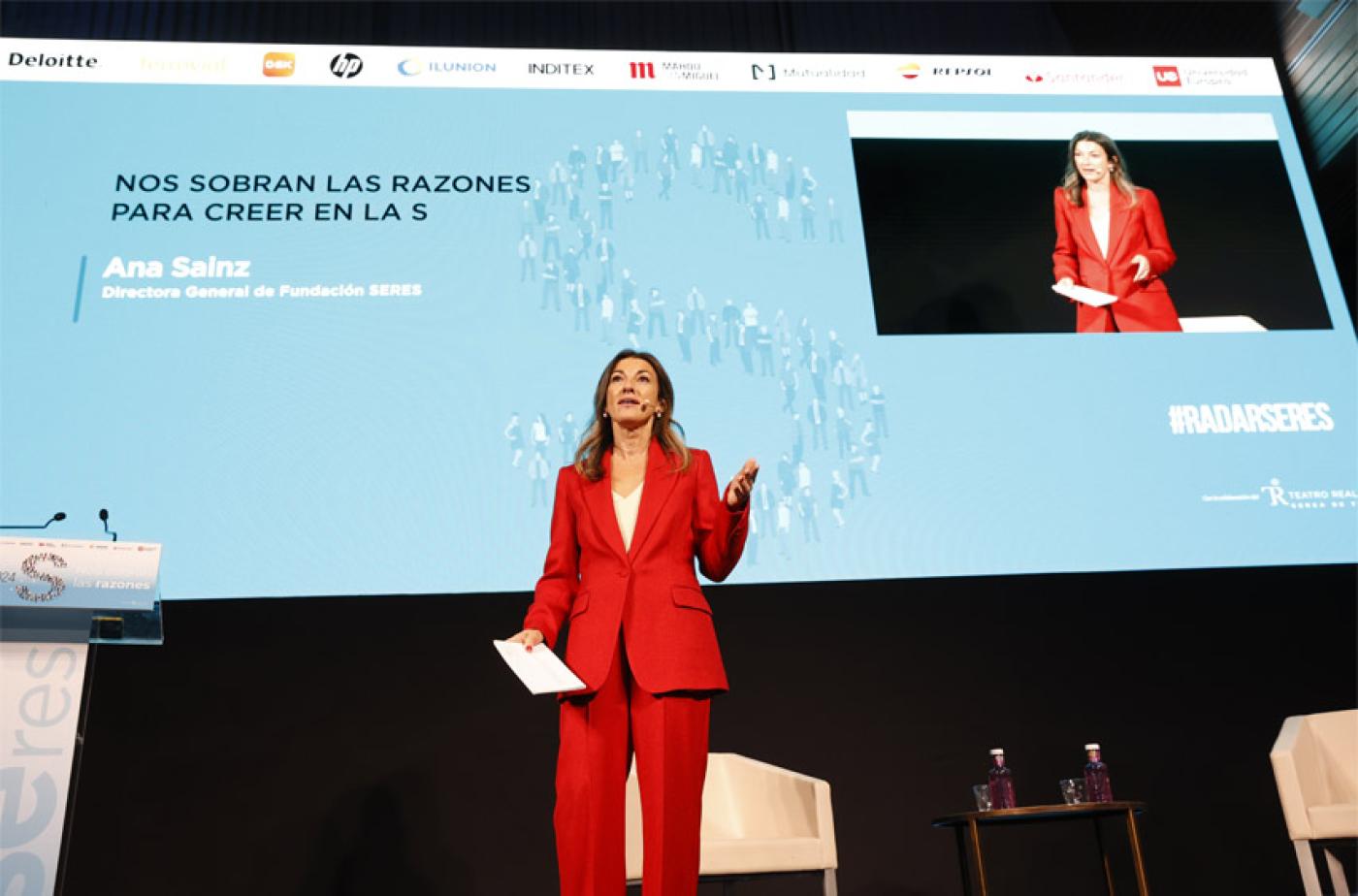The sixth edition of RADARSERES showed once again that there are plenty of reasons to put the ‘S’ of social issues at the center of corporate management. During the meeting, Ana Sainzgeneral director of SERES Foundationinsisted that a well-integrated ‘S’ is key to achieving more competitive companies and a stronger society. In this sense, he made it clear that “there is a long way to go in terms of social impact on companies in this country, although the companies’ commitment is firm and this is what we have seen in these 15 years since Fundación SERES was born.”
Sainz also pointed out that this transformation requires “commitment, measure, communicate and better express purpose”, for which SERES has created the SERES Social Footprint Map so that companies can know in advance and measure the social impact of their actions on employees, customers, suppliers and communities. “It would be a great loss of opportunity not to focus on what is most important, which is to use indicators as true tools of change, as strategic indicators to transform ourselves and transform,” he noted.
During the day, such important issues as the just transition, purpose, human rights management, responsible leadership, technology with an impact on people, the new longevity and the social role of banking were discussed. Prominent voices from leading companies in our country such as Deloitte, Ferrovial, GSK, HP, ILUNION, Inditex, Mahou San Miguel, Mutualidad, Fundación Repsol, Santander and European University and leading figures from the business and social world spoke about these and other priorities of the social agenda 2025.
The meeting began with a dialogue between Ignacio MadridejosCEO of Ferrovial, and Fernando Ruizpresident of Fundación SERES, on a key issue: purpose. Madridejos highlighted that “at Ferrovial, we dedicate every day to designing, building and operating infrastructure that improves the quality of life of all citizens and that serves vulnerable communities and groups. We make this purpose a reality through our activity and the company’s social action, which focuses on guaranteeing that these groups have access to basic infrastructure such as drinking water, sanitation or soup kitchens.”
Just transition, energy and territory
They discussed the importance of addressing a just transition with a focus on people Concha Iglesiasleading partner of Climate Change and Sustainability at Deloitte Spain, and Clara ReyDirector of Sustainability at Repsol.
“For Repsol, the energy transition will only be possible if it includes the principles of sustainability, security of supply and competitiveness. Solutions are needed that minimize the social and economic impact on customers, employees, the communities in which we operate, the value chain and society in general,” said Clara Rey.
For her part, Concha Iglesias stated that “the energy transitionthe automation and the digitization will be the most notable changes in the work environment in the short term. We are immersed in a social and economic paradigm shift and the debate on social and economic equity is at the center of the conversations. All of this requires a cultural transformation, in which the purpose guides the companies’ strategy and decision-making.”

Healthy future
According to Guillermo de Juan Echávarrivice president of Corporate Relations and Communication of GSK Europe and Spain, “we need to promote health systems based on prevention to respond to new health challenges associated with factors such as climate change, the importance of healthy aging or the appearance of new diseases at increasingly younger ages.”
and for Emilio Bouzaprofessor of the Department of Medicine of the Complutense University of Madrid and expert in microbiology, “to continue advancing, we need to get ahead of the disease, invest in prevention and generate healthy environments that improve the quality of life. Because investing in prevention not only translates into a better quality of life, but also generates savings and improves the efficiency of the system.”
Technology and AI
How to use technology to transform challenges into opportunities to create a better world inclusive, fair and equal was the topic that focused the dialogue between Helena Herreropresident of HP for Southern Europe, the Middle East and Africa, and Alfonso Muñozeditor of Telecommunications, Technology and Digital companies at El Español-Invertia.
Both experts agreed that to achieve the above and not leave anyone behind, momentum must be given to talentthe digital training and improve the connectivity in the rural world. “We have plenty of reasons to understand technology as that catalyst for unprecedented social change, which helps us face the important challenges that our society faces. Committing to the ‘S’ in Social is essential to ensure that everyone benefits from this progress, promoting inclusion and equity in a digital and innovative world,” Herrero said.
Social and economic progress
He also participated in the meeting Alejandro OñoroCEO of ILUNIONwho highlighted the advantages of integrating the social commitment within the company’s strategy.
“The 10 years of ILUNION consolidate a unique business model that demonstrates that another way of doing business is possible. Our purpose is ‘Build a better world with everyone included‘. It is our motivation, objective and, at the same time, our legacy to society,” said Oñoro, who stressed that it is possible to create life opportunities through the balance between economic and social profitability.
The new longevity
Currently, up to seven very different generations can coexist in a company, with very different values and motivations. Learning to manage, attract and seduce this great diversity is one of the great challenges for organizations of the 21st century. They talked about it Fernando Arizadeputy general director of Mutualidad and president of the Institute of Spanish Actuaries, and Maria Angeles Duránprofessor of Sociology and a world reference in research into longevity and the care economy, for whom “the new great social class of the 21st century is caregiving. Largely made up of women and immigrants, they are the ones who care, paid or unpaid.”
The increase in life expectancy entails the fact that after retirement there are still many years of life left in full capacity. A change of scenario in which new financial planning will be necessary to face the years that pensions would not cover. “The reality of society is changing: We are an aging society.. That is where companies must focus when we design our value proposition. In this sense, the insurance sector is a tool that balances society very well and where the state or people do not reach, insurance has to reach and cover that gap in the protection of citizens, especially the most vulnerable such as the older people,” said Ariza.
Strategic alliances
The alliance between companies and NGOs is essential to promote the inclusion of the most vulnerable. They agreed on this Jesus Nunezgeneral director of the Mahou San Miguel Water Business Unit, and Ramon Reyespresident of the Spanish Association Against Cancer.
Núñez insisted that “when we considered this alliance with the AECC, we said that it had to be real, lasting. To do this, it had to be in the company’s business strategy. Part of our commitment is to extend the social to the value chain and our interest groups.”
For his part, Reyes stated that “these alliances have to be mutual benefit. These actions put us in the spotlight, allowing cancer research to have funds. “We share interest and purpose: to do something that improves people’s lives.”
